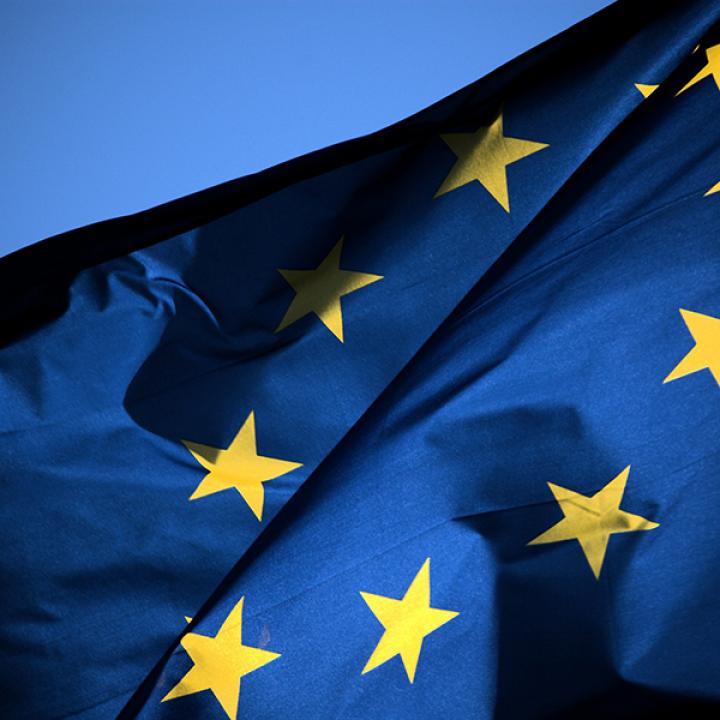
- Policy Analysis
- Articles & Op-Eds
Presidential Elections in the United States: Political and Economic Consequences for Europe
Also published in The European Security and Defence Union

There is greater American bipartisan consensus on national security strategy than Washington’s fractious politics would indicate, creating ample room for transatlantic cooperation on that front.
The period from 2017–2020 will be remembered as an especially difficult one for transatlantic relations, and one in which favorable European views of the United States reached all-time lows or matched their Iraq War nadirs. It is self-evident that some of this disapproval should be attributed to the Trump Administration’s often dismissive, sometimes disdainful attitude toward its erstwhile European allies. While public spats were the most visible source of European exasperation with the United States under President Trump, however, they were arguably exceeded by US allies’ frustration over the erratic and inconsistent nature of decision-making in Washington.
The Reasons for the Transatlantic Divide
Yet it would be a mistake to chalk the transatlantic divide up entirely to the Trump administration’s eccentricities. To a great extent, European approval of the United States appears tied to US domestic politics. The Trump administration’s policy decisions that Europeans cared most about—the US withdrawals from the Paris climate accord and the Iran nuclear agreement, for example—reflected longstanding political divides in the United States more than anti-Europe animus.
Most importantly for Europe, however, some of the Trump administration’s disagreements with Europe reflect shifts in American national security strategy that are almost sure to persist under President-elect Joe Biden. Trump’s demands, for example, that European members of NATO boost their defense spending echoed similar complaints by Barack Obama, and will almost certainly be carried forward by Biden. Likewise, American discomfort over projects like the Nordstream pipeline, or technology and infrastructure cooperation with China, appear unlikely to ease with Biden’s election.
These concerns reflect Washington’s broad focus on strategic competition with Russia and China, a trend which has been long in building but was given its clearest articulation by the Defense Department under Secretary James Mattis. This emphasis on great-power rivalry has led Washington to question legacy commitments (introspection from which NATO has not been spared), seek to establish or strengthen relationships elsewhere, and demand more of allies as it seeks to shift its resource allocations. Under President Trump, however, Washington’s efforts to recruit Europe to partner in this policy shift were transactional and confused. The US sought to persuade Europe to join it in limiting Chinese economic inroads while decrying Europeans as “worse than China” on the issue. Likewise, European NATO members increased their defense spending and Washington stepped up its own defense investment in Europe, but they did so absent any high-level meeting of the minds or evident progress among leaders at dysfunctional NATO summits.
Need for a Concerted Strategic Dialogue
Europe and the Biden administration together will need to replace this haphazard engagement with a concerted effort at strategic dialogue, seeking if not to develop a common agenda then at least to reach a clearer understanding of one another’s perspectives and opportunities both for collaboration and for the division of labor. Fortunately, they will have a solid foundation on which to build—there is greater bipartisan consensus on national security strategy than Washington’s fractious politics would indicate, and European states themselves have not only made greater investments in their own defense but have demonstrated an increased willingness to use their capabilities in the Middle East, Africa, the Mediterranean, and further afield, as well as an alertness to the dangers posed by revisionist powers. The frame of reference for a renewed transatlantic strategic dialogue should be about division of labor and how an increasingly focused United States and an increasingly capable Europe can cooperate to address mutual threats as well as support each other to defend and update an international order conducive to freedom and prosperity.
Michael Singh is the Lane-Swig Senior Fellow and managing director at The Washington Institute. This article originally appeared in Issue 37 of the European Security and Defence Union magazine.



